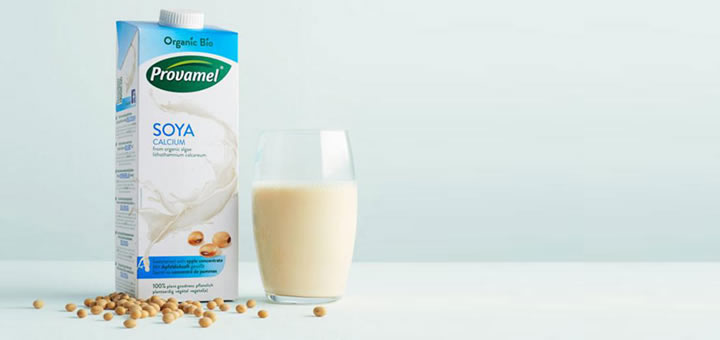
A Guide to Milk Alternatives
Plant based alternatives to milk have become extremely popular over the last few years, with plant milk sales increasing by 30% since 2015 according to Mintel. Only a few years ago the only common option would be soya – in the UK, Alpro was the only well known producer of soya milk, and if you wanted anything other than soya you simply wouldn’t find it in mainstream shops.
But why are people switching to plant based alternatives? There are many reasons, firstly there are dietary reasons, there has been a huge increase in autoimmune diseases over the last 50 years. Autoimmune diseases are caused when the immune attacks the body’s own tissues, this can happen with dairy. According to Allergy UK around 2-3% off children have an allergy towards cow’s milk. An allergy is different from an intolerance, a dairy intolerance (or lactose intolerance) is more common and can have the symptoms of diarrhoea, bloating, stomach rumbling. For people with an allergy or intolerance, plant based alternatives are a lifesaver.
Of course many more people are now going vegan, many years ago replacing milk would have been one of the biggest challenges but thanks to the arrival of many different types of plant based alternatives this is no longer the case. Whilst you can pick up a milk alternative in a shop (although I’m sure you’d pick Ethical Superstore to buy from!) it is now pretty much accepted that you can ask for a plant based alternative such as almond milk in your tea or coffee in your favourite café or restaurant, that I think officially makes it mainstream!
The dairy industry has also come under fire as supermarkets have put pressure on dairy farmers, many have turned their operations into more of a factory than the picturesque country farm many people imagine. The issues around cruelty and environmental impact of the dairy industry would be enough for it’s own separate blog. You can read more here in this article.
Another reason people are turning vegan, or perhaps just cutting down their meat intake is the environment, with a plant based diet having much less carbon footprint. The same is true with dairy verses plant milk, although the environmental footprint can vary between the types of plant milk.
The health benefits of plant based milk over cow’s milk is another reason people are switching, with many varieties being rich in vitamins and minerals, lower in fat and containing no cholesterol. However it isn’t all straightforward, each different type has different qualities so we thought we’d make a guide to each of them so you can make the right decision for you.
Almond Milk
Almond milk is the most popular milk alternative and the one you are most likely to find as an option in a coffee shop. Before this, soy milk as the most popular alternative but some people with a lactose intolerance also have an intolerance towards soya so almond makes a great alternative to these. Unsurprisingly it’s made with almonds, blending them with water and straining them. Sweeteners, salts and other vitamins can be added as well as thickening agents. Cheaper almond milk can contain as little as 2% almonds so it’s always worth checking the ingredients.
Almond milk has a slightly sweet and nutty flavour, there are sweetened and unsweetened versions. Some people find almond milk not as palatable as cows milk so it might be worth trying a sweetened version (although these are likely to contain more sugar)
Some almond milks have vanilla added, so as a result can go well with coffee and can be used in place of cows milk in desserts and baked goods. Sometimes almond milk can curdle when added to coffee, this is down to the high temperature and acidity of black coffee. To get around this you can avoid boiling the water to 100C (this is also better for the environment, our Vektra Kettles can help you do this!) or you can find a barista edition which should prevent the curdling. Almonds are highly nutritious but because almond milk contains a lot of water, the milk is not as beneficial as eating almonds. Almond milk has half the fat, quarter of the calories but is lower in protein and carbohydrates. Please note, it can’t be used as a substitute milk for toddlers due to low calorie levels.
One cup of almond milk (240ml) typically contains around 30-35 calories, 1 g of protein, 1-2 grams of carbohydrates and 2.5 g of fat plus 330mg of calcium.
Almond milk is a natural source of vitamin E, a group of antioxidants that help protect the body from disease-causing substances known as free radicals. Almond milk is sometimes criticised for requiring a lot of water to produce, however it still requires six times less than cow’s milk does.
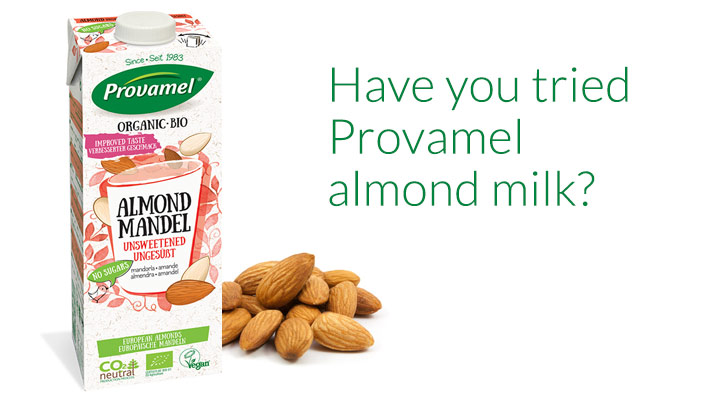
Cashew Milk
Cashew milk is made from a mixture of cashew nuts or cashew butter and water. Cashew milk is smooth with a hint of cashew flavour and works well in tea as it’s not too sweet. Cashew is great for thickening smoothies and as a creamier substitute for cow’s milk in desserts. Cashew milk has fewer than a third of the calories of cow’s milk, half the fat and significantly less carbs but with less protein. Due to the nut pulp being strained from the milk a lot of the fibre, proteins, vitamins and minerals found in whole cashews are lost in the milk. Cashew milk however is a good source of zinc, copper and magnesium, which help support your immune system. With a lower protein content than other milk alternatives it may be worth looking at other with higher protein if you have higher protein requirements.
One cup of cashew milk (240ml) typically contains around 25 calories, 1 g of protein, 1 gram of carbohydrates and 2g of fat.

Hazelnut Milk
Hazelnut milk is not as widespread as almond milk, there is a similar process for making hazelnut milk as soy and almond milk, the nuts are soaked, blended, strained, sometimes boiled. Some brands use roasted hazelnuts. Hazelnut milk often looks different being slightly brown in colour with a creamy nutty and slightly bitter taste, so perfect for coffee and can be used in baking.
Hazelnut milk is low in calories, has no cholesterol and is a good source of vitamins B1, B2 and B6, vitamin E and folic acid. Hazelnut milk also contains dietary fibre; it does however have double the carbohydrates and one third the protein of cow’s milk.
One cup of hazelnut milk (240ml) typically contains around 65 calories, 1 g of protein, 3 grams of carbohydrates and 3g of fat.
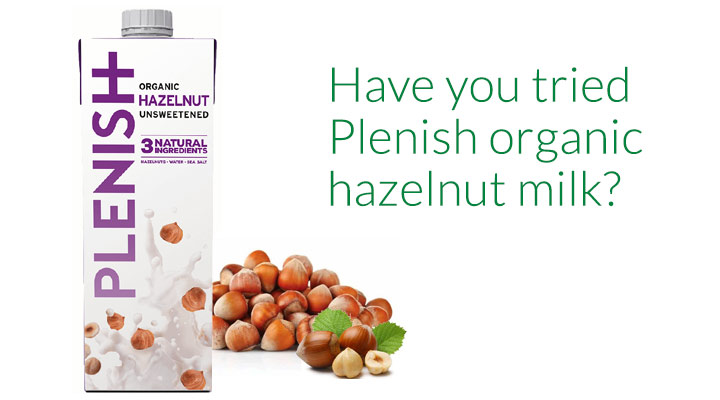
Soy Milk
Soya Milk can either be made with soy beans or soy protein. Soy beans are quite bitter so it often contains thickeners and vegetable oil to improve the taste. Soy milk does have a very high protein content with around -8g per cup so comparable to cow’s milk but with lower calories. Soy milk is a good all rounder working well in coffee and tea as well as for baking with a sweet and creamy taste. Soy milk can be has the bonus of being cheapest of all of the milk alternatives!
Switching from cow’s milk to soy if you have a lactose intolerance may not work as many people who are intolerant to the protein in cow’s milk are often intolerant to the protein in soya milk as well, around 50% crossover. If you do have an intolerance, trying an elimination diet (after consulting your GP) you should be able to establish whether soy would work for you.
One cup of hazelnut milk (240ml) typically contains around 80 calories, 7 g of protein, 13g carbohydrate and 4g of fat and 330mg of calcium.
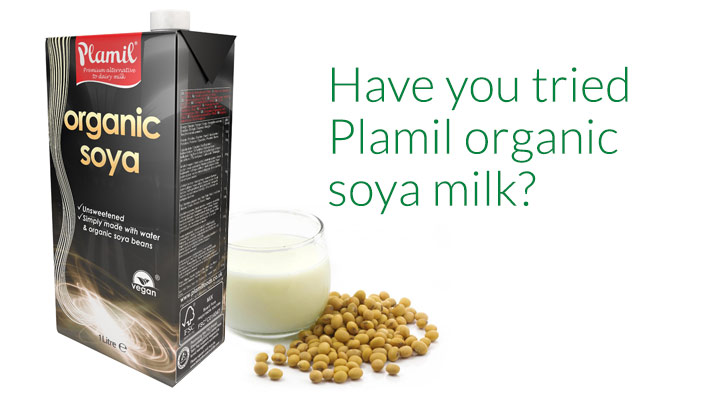
Oat Milk
Oat milk is rapidly becoming more popular and may even overtake the rest to become the king of milk alternatives! It has however been around for a while, Oatly actually launched 25 years ago. It is made from the liquid leftover when oats are soaked in water. For many people with an intolerance to soya and nut allergies oat milk is the answer. But it’s not just for people who are avoiding other milk alternatives, it is perhaps the most like cow’s milk in taste, and barista editions can taste like whole milk.
Unfortunately they are low in protein, vitamins and minerals but some are fortified with vitamins and minerals. Naturally, oat milk isn’t as nutritious as whole oats. As a result, it’s often enriched with nutrients — including calcium, potassium, iron, and vitamins A and D. Oat milks are good for the environment using a 1/6 of the water that Almonds require to grow. Sometimes looks darker in your tea than cow’s milk so might look like your tea is a bit stronger than it really is. As with all plant based milk alternatives, oat milk has a smaller environmental footprint than cow’s milk but also has a smaller footprint than other alternatives like almond.
One cup of oat milk (240ml) typically contains around 120 calories, 3 g of protein, 16g carbohydrate and 5g of fat and 2 grams of dietary fibre.
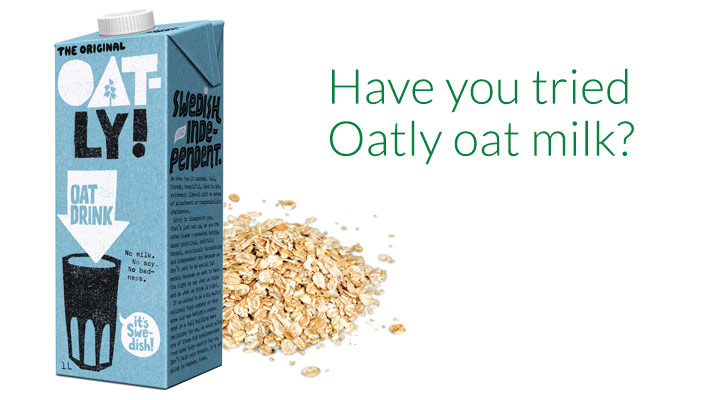
Coconut Milk
Coconut milk is a little more expensive than the others listed here. Unlike coconut water it is made from the white coconut flesh, grated and soaked in hot water so the coconut cream can rise to the top and be skimmed off. Coconut milk has a silky texture and unmistakable coconut flavour so it works well with lattes but not so much in tea unless you like sugar in your tea! Coconut milk can be used in cooking in cakes or curries for example but you will need to cook at a lower temperature and stir often to avoid curdling. Coconut milk is high in fat and once glass can contain 300 calories which is double the amount in whole fat milk. Coconut are however high in a wide range of vitamins and minerals including C,E,B, iron, selenium and magnesium.
Coconut milks are moderately sustainable as it requires less water than soy and produces much less greenhouse gas than cows, the most important thing is to choose ethical brands. Coconut milk is not particularly easy to make at home unless you are good at cracking coconuts!
One cup of coconut milk (240ml) typically contains around 50 calories and 5 g of fat, 1g of carbohydrates but less than 1 g of protein and 220mg of calcium.

Rice Milk
Rice milk is made from milled white or brown rice and water. As with other non-dairy milks, it often contains thickeners to improve the texture. White and Brown rice milk do taste different as with the whole rice grains so worth trying both types.
Rice milk can curdle in the presence of acids like almond milk so again there are barista versions available, one other option is to heat slowly before use. Rice milk can be used for cooking and baking but does not thicken when you cook like oat milk does.
Rice is a water intensive crop so not as sustainable as some other milk alternatives. It is however the least likely to trigger allergic reactions or intolerances. It is not however recommended for children under 4. Rice milk can quite easily be made at home.
Rice milk has similar calories to cow milk but double the carbohydrates. It does have less protein and fat than cow’s milk.
One cup of rice milk (240ml) typically contains around 130 calories, less than 1 g of protein, 26g of carbohydrates and just over 2.5 g of fat plus 315mg of calcium.

Pea Milk
Pea milk is one of the more recent editions to the milk alternatives. It is made by harvesting yellow split peas and milling them into flour. The flour is then processed, separating the pea protein from the fibre and starch. The former is further purified and blended with water and other ingredients, including sunflower oil, salt, and vitamins like B12.
Pea milk is not green, and doesn’t taste of peas! Instead it is very rich and creamy. Pea milk is better for the environment than cow’s milk, as yellow peas grow in areas that receive lots of rain and need little or no irrigation. It is however difficult to make at home.
Pea milk is very nutritional and contains a good amount of protein. As a result peas are rapidly becoming popular base for vegan protein powders.
One cup of coconut milk (240ml) typically contains around 70 calories, 8g of protein, 0g of carbohydrates and just over 4.5 g of fat plus 300mg of calcium.

Hemp Milk
Hemp milk is made from the seeds of the hemp plant, the same species as cannabis but will only have trace amounts of THC so will have no hallucinogenic effect!
It has a slight hay like smell which may put some people off, slightly sweet but watery so perhaps a better replacement for skimmed milk. Despite the whole value of the seeds not being transferred with some omegas, calcium, vitamin B12 and vitamin D lost hemp is one of the most nutritionally rich. Similar in fat to cows milk with half the calories and protein. Hemp milk is often fortified with calcium, phosphorus and vitamins A, B12 and D. Most of the fat in hemp milk is unsaturated essential fatty acids, including linoleic acid (omega-6) and alpha-linolenic acid (omega-3), which are essential for building new tissue and membranes in your body. On top of this, hemp milk provides protein that your body can easily digest and use. It’s one of few plant-based complete proteins, as it contains all of the essential amino acids that humans need from food
Hemp milk is a very sustainable alternative to milk, non GMO plant that grows without depleting nutrients from the solid and requires few chemicals to produce good yields. One third of the water almonds need to grow. One other benefit is that it does not curdle or separate in hot water like almond milk will.Can be made at home.
One cup of hemp milk (240ml) typically contains around 83 calories, 4.7g of protein, 1.3g of carbohydrates and 7.3 g of fat plus 283mg of calcium.
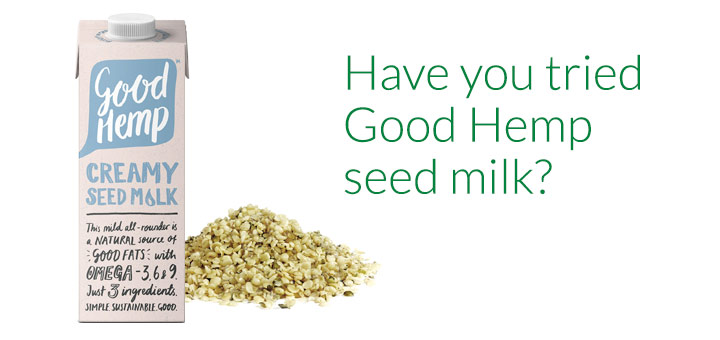
Quinoa Milk
Quinoa milk is more expensive and harder to find than many other more common milk alternatives. The popularity of quinoa has exploded in recent years with it being a very healthy and nutritional addition to the dinner plate so it’s no wonder it is gaining popularity in its use as a milk alternative.
Similar number of carbohydrates to cow’s milk but half the calories, quinoa milk has significantly less fat and compared to other milk alternatives is relatively high in protein and the protein is considered a complete protein source which means it provides all nine essential amino acids. Quinoa is a great source of antioxidants and minerals, providing more magnesium, iron, fibre and zinc. Quinoa contains manganese (essential for metabolism and growth), phosphorus (essential for bone health), copper (important for heart health), folate (essential or cell function and tissue growth), iron (perfomas many important functions such as transporting oxygen in red blood cells), magnesium and zinc.
Quinoa milk is very sustainable as it can grow in a wide range of conditions. It is also easy to make at home, all you need to do is blend cooked quinoa with water and then strain. You can also try blending in dates and spices, such as cinnamon, to improve its taste.
One cup of quinoa milk (240ml) typically contains around 120 calories, 4.4g of protein, 21.3g of carbohydrates and 1.9 g of fat plus 283mg of calcium.
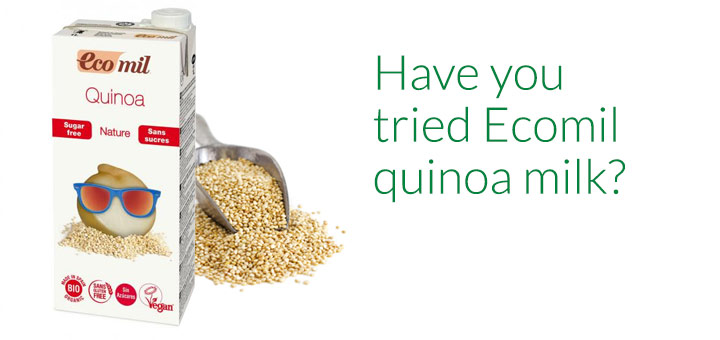
Tiger Nut Milk
Tiger nuts aren’t really nuts (and have nothing to do with tigers!), they are actually edible tubers with a striped coating (hence the tiger name!). Tiger nuts are grown in many hot countries around the world. Tiger nuts are about the same size as a chickpea with a chewy texture and sweet nutty flavour much like coconut. Tiger nuts were one of the first plants cultivated in Egypt for both food and as a medicine due to them being so rich in nutrients.
Tiger nuts may promote a healthy digestion with them being high in fiber which passed through your gut without being digested, they also contain resistant starch, a type of fiber that can help feed the good bacteria in your gut further aiding digestion. Tiger Nuts are considered a superfood as they contain a great amount of minerals (phosphorous, magnesium, iron and calcium) and the vitamins E and D. This is why tiger nut drink has so many health benefits, such as helping to lower cholesterol thanks to its vitamin E and oleic acid, and alleviating the symptoms of arteriosclerosis thanks to an essential amino acid: arginine. Tiger nut milk is naturally sweet with a mellow nutty flavour.
One cup of hemp milk (240ml) typically contains around 134 calories, 1.5g of protein, 24.5g of carbohydrates and 4 g of fat.

For reference one cup of cow’s milk (240ml) typically contains around 150 calories, 8g of protein, 12g of carbohydrates and 8g of fat plus 305mg of calcium.
We’d love to hear what you think, tell us in the comments below which milk alternative you like the most:


